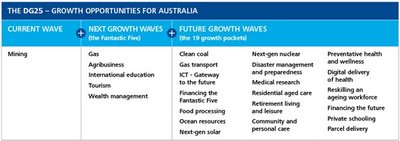Value-added food processing is future growth hotspot, says Deloitte
Deloitte has identified value-added food processing as one of the 25 growth hotspots to watch in the next 20 years. The firm says food processing offers huge potential for the economy.
The Deloitte report, Positioning for Prosperity? Catching the next wave, identifies the Deloitte Growth 25 (DG25) - a group of compelling growth opportunities for Australia over the next 20 years.

“Similar to the fluctuations of the wider agribusiness sector, the local food processing sector has had a bumpy ride of late. The lower-value, higher-volume end of the market has struggled to compete with overseas processors not weighed down by a strong Australian dollar (A$) and relatively high input costs from labour and electricity,” said Rob McConnel, Deloitte agribusiness leader.
“According to our analysis, Australia needs to move from producing commodity products to growing, processing and supplying premium produce. This is a sector in transition with a shake out of well-established players occurring alongside the emergence of specialists operating in the premium space where they are in a great position to exploit new market growth.
“After feeding ourselves, Australia can meet only a small percentage of Asia’s current food demand - let alone its future demand. That suggests that our opportunity isn’t so much to be the supermarket to Asia as its delicatessen - offering high-value, high-margin products.
“New Zealand has already done this, showing stand-out success in global dairy markets and turning its might in agribusiness into downstream manufacturing dominance as well. We are seeing increased interest from investment groups such as private equity, corporates and sovereign wealth funds in Australian food-processing assets.
“This is being driven by factors such as retailers’ desire to virtually integrate their supply chain, trace produce from farm to store and significant upside in the agribusiness growth sector overall. While exposing them to the upside, investing in a number of areas within food processing can help these investors to reduce their exposure to some of the variability of primary production assets including commodity prices.”
While the Australian dollar has hurt the food processing sector, McConnel says other factors such as our high labour and energy costs, as well as food industry regulations have negatively impacted the sector.
“The Tasmanian salmon industry is a shining example of how Australia’s more stringent regulatory practices have been turned into an advantage, to achieve a reputation as a product of the highest quality - one which Asia’s growing middle classes are prepared to pay a premium for,” McConnel said.
“The DG25 reflects our analysis of those sectoral hotspots with the greatest potential to contribute to Australia’s prosperity,” said report co-author Chris Richardson from Deloitte Access Economics.
“As Asia’s boom evolves and new domestic opportunities arise, our research shows that Australia’s growth options remain excellent. Our future prosperity will come from a more diversified spread of sectors, enabling Australia to remain the fastest-growing developed Western nation in the world in the coming decade.”
Two more Italian tomato exporters investigated for dumping
Vegetable producers and processors have welcomed an announcement that the Anti-Dumping Commission...
Global Food Safety Conference to feature LRQA, Cargill, Metro Group and World Bank
Representatives from LRQA, Cargill, Metro Group and the World Bank are among some of the keynote...
Labelling review recommends 'per serving' information be scrapped
The independent review of labelling has issued a recommendation that proposes the declaration in...








